MercoPress. South Atlantic News Agency
Tag: Raúl Castro
-
Thursday, April 19th 2018 - 22:24 UTC
Miguel Díaz-Canel becomes the new president of Cuba: there is no chance of a Trojan horse
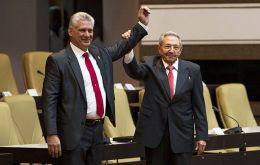
Miguel Díaz-Canel has been ratified on Thursday by the National Assembly of Cuba as the new president of the Council of State, the country's first leader in practice. The parliament ratified the former vice president with 99.83% of the votes of the deputies present. Diaz-Canel replaces the General Raúl Castro, who retires from power after 12 years at the head of the country. However, the new president clarified that Raúl Castro “will lead the most important decisions” for the country.
-
Thursday, April 19th 2018 - 07:49 UTC
The Castro dynasty begins its 'controlled' exit under president Diaz-Canel
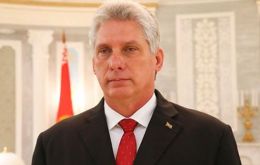
An era will end in Communist-dynastic Cuba on Thursday when President Raul Castro retires, handing over the reins to his right hand man Miguel Diaz-Canel, born the year after brothers Fidel and Raul led their 1959 leftist revolution. However after nearly 60 years of Castro rule, the change is not expected to herald sweeping reforms to the island’s state-run economy and one-party system, one of the last in the world.
-
Wednesday, April 18th 2018 - 07:37 UTC
Who is Miguel Díaz-Canel who is expected to lead Cuba after 60 years of the Castro dynasty

Cuba is set to undergo a historic shift this week, elevating a relatively unknown Communist Party official to replace retiring President Raúl Castro. But who is Miguel Díaz-Canel? And what does his ascension to the top of Cuba's government mean for a country that has been run by the Castro brothers for nearly 60 years?
-
Monday, March 12th 2018 - 09:43 UTC
Raul Castro succession process takes off; heir apparent blasts US for “resuming a Cold War rhetoric”
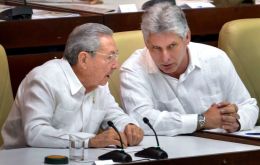
Cuba Vice President Miguel Diaz-Canel, tipped to succeed President Raul Castro, accused the US yesterday of “resuming a Cold War rhetoric” and of “attacking” the Cuban revolution. Diaz-Canel spoke to state television after casting his vote in elections for a parliament that will choose Castro’s successor on April 19.
-
Tuesday, December 26th 2017 - 10:41 UTC
Cuba preparing for transition to new generation: Díaz-Canel should replace Raul Castro in April
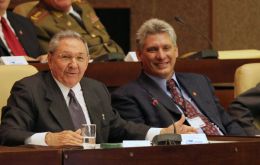
The Cuban parliament enacted a proposal that extends Raúl Castro’s term from the original February 24 deadline. The Council of the State underscored that the extension was based on the “exceptional situation” Cuba finds itself in due to costly damages Hurricane Irma inflicted on the island last September.
-
Monday, September 18th 2017 - 09:40 UTC
Washington considers closing embassy in Havana because of “sonic attacks”

The United States is considering closing its embassy in Cuba after diplomatic staff reported health problems which Washington blames on a “sonic attack”. Secretary of State Rex Tillerson said a decision whether to shut to the mission in Havana was “under evaluation”.
-
Tuesday, May 2nd 2017 - 06:30 UTC
End of an era in Cuba? Last of a May Day celebration without a Castro brother
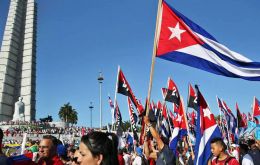
The Cuban government's traditional May Day parade Monday is the last to be overseen by President Raul Castro, and the first without his late brother and revolutionary predecessor Fidel.
-
Monday, January 2nd 2017 - 12:41 UTC
Castro condemns “obsolete mentality” against foreign capital, as economy contracts
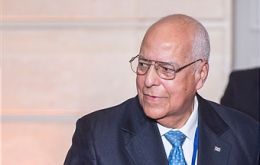
In spite the significant surge in tourism set off by the detente with the United States, Cuba’s economy shrank in 2016 for the first time in nearly a quarter century with the main culprit: a plunge in aid from crisis-stricken Venezuela. President Raul Castro called on the Cuban people to overcome the obsolete mentality against foreign capital.
-
Monday, December 19th 2016 - 08:22 UTC
Cuban dissidents still under Raul Castro's iron fist despite alleged openness
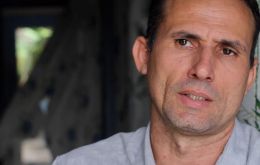
Government officials have arrested dozens of Cuban dissidents as well as an American human rights lawyer, it was reported Sunday. Others were kept from marching in Havana to demand the relaease of political prisoners in what would indicate that the one-party communist state is in no mood for dissent, despite all that was said to US President Barack Obama and Pope Francis.
-
Saturday, December 17th 2016 - 16:48 UTC
Raul Castro's Cuba allows farmers to hire workers directly
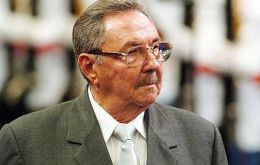
The Cuban government Friday allowed farmers to hire workers directly and no longer have to go to cooperatives in a step to set aside strict controls on their economy to boost production for a country which imports more than two-thirds of its food. In other areas of the economy, such as restaurants, Cuba has already allowed small business owners to hire their staff directly.
